Tooth loss is a common issue that people face. Approximately 178 million Americans are missing at least one tooth while 40 million are missing all of their teeth. The good news is that just because you’ve suffered from tooth loss in the past doesn’t mean that you need to go the rest of your life with unsightly gaps in your smile. At NU Dental Barnegat, we offer customized dentures to restore the function and appearance of your smile. If you’ve decided it’s time to get your smile back, give us a call to schedule a consultation!
Who Is a Good Candidate for Dentures?

Dentures are a lifechanging tooth replacement option for people who are missing anywhere from several to all of their teeth. Depending on the number of teeth that you are missing and where they are located in the mouth, a customized treatment plan can be created just for you. Just keep in mind that if you have any existing oral health issues, like tooth decay or gum disease, they will need to be treated ahead of time. The health of your smile is our number one priority!
Read More
Effects of Missing Teeth

Whether you lost your teeth due to gum disease, physical trauma, or other circumstances, your condition can have serious consequences for your daily life. Dentures can reduce or possibly even eliminate some of the effects of missing teeth. For example, they may be able to help you if:
- You are self-conscious about your appearance. Not only might you hesitate to smile in public, but you may also dislike the way your cheeks look when there are no teeth to support them. Dentures can help you have a more youthful appearance.
- You cannot easily enjoy your favorite foods. Dentures can increase your chewing ability and allow you to eat a wide range of foods.
- Missing teeth are affecting your mental and emotional wellness. Rebuilding your smile may help you to feel better about yourself and enjoy renewed confidence in social situations.
What Qualifies You for Dentures?

You may qualify for dentures if:
- You are missing all or most of your teeth. (If you are missing just one or two teeth, a different tooth replacement option may be better for you.)
- You do not have active gum disease or other oral health conditions that could affect your ability to use a prosthetic.
- Your gums and jawbone are healthy enough to support dentures.
- You are looking for a cost-effective way to rebuild your smile.
Alternative Tooth Replacement Options
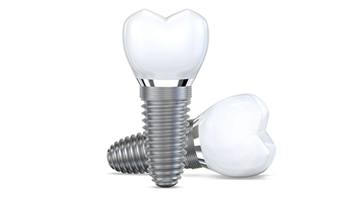
If dentures are not right for you, you may choose to pursue another form of tooth replacement, such as:
- A fixed bridge. A fixed bridge relies on your remaining natural teeth for support. Usually, a bridge can be used to replace 1 – 3 teeth in a row. This is a durable and long-lasting treatment, and it usually takes just a few weeks to complete.
- Dental implants. Dental implants are small titanium posts that get surgically placed into the jawbone. They act as prosthetic tooth roots and can provide a very sturdy base of support for crowns, bridges, and dentures. They are commonly regarded as the very best form of tooth replacement.
Learn More About Dental Bridges
Learn More About Dental Implants
Types of Dentures

During your initial consultation, we will determine which of the followig options would be ideal to complete your smile:
Partial Dentures
If a dental bridge isn’t enough to restore your smile, a partial denture may be a good option for you. They are customized to fit perfectly in the mouth between your remaining healthy teeth. Partial dentures can replace teeth in different locations of the mouth and keep neighboring teeth from shifting around and causing misalignment issues.
Full Dentures
Full dentures are supported by the shape and natural suction of the mouth and gums. They are used to replace an entire arch of missing teeth, either on the top or bottom. It’s crafted with a lifelike base and enamel-colored set of replacement teeth. Ultimately, this allows for a beautiful, natural-looking appearance.
Implant Dentures
If you want a more stable, longer-lasting solution, dental implant dentures could be the perfect solution. We will start by placing a series of dental implants throughout the jawbone before attaching the customized restoration. With implant dentures, you can expect 70% of your natural chewing function to be restored. This type of denture is designed to last for several decades with proper maintenance, so you don’t need to worry about replacing it. To make a good candidate, it’s important that you have a strong jawbone for a sturdy foundation. During your consultation, we can determine if they are the right option for you.
How Dentures Are Made

After you decide to move forward with dentures, you might be curious about the road in front of you. How long will the process take, and exactly what is involved in making dentures? The process can vary a bit from case to case, but many details are often the same across the board. Would you like to learn more about the denture creation process? Continue reading below. What you discover might just enhance your appreciation for your new set of teeth!
Read More
What Are Dentures Made Of?

Dentures consist of two main parts:
- The base of dentures is the gum-colored arch that supports the artificial teeth. In most cases, the base is made of acrylic, which tends to sit comfortably on the gums as long as it is well-shaped. For partial dentures, the acrylic base may have acrylic or metal clips to wrap around the natural teeth and keep the denture in place.
- The teeth of dentures are usually made of acrylic or porcelain. Often, porcelain is used for full-mouth tooth replacement, while acrylic is favored for partial mouth replacement due to its softer nature. It is less likely to cause premature wear and tear on the remaining natural teeth.
The Denture Creation Process

Creating dentures is a multi-step process. Here is a simplified overview of how it works:
- We take impressions of your mouth. We have a high-tech digital impression scanner that we can use to create a computerized model of your gums. That can then be used as the basis for designing your new prosthetic.
- We send the impressions to a dental laboratory. The laboratory will use the impressions we send them to create a wax model of your gumline. Then, the lab team can use a machine called an articulator to place teeth in the wax gumline.
- You get fitted using the wax denture. After the lab sends the wax-up to us, you will visit us for a fitting. We will communicate with the laboratory so they can make necessary adjustments before they fabricate your permanent denture.
- You receive your new teeth. When you return to our office, we will make any necessary final adjustments to your prosthetic. Then, you can go off and begin the process of adjusting to your new smile.
Usually, the denture creation process takes several weeks.
Adjusting to Your New Dentures

Some patients find that their new denture feels strange or even a bit uncomfortable. This issue is nothing to worry about. With time and practice, most people adapt to their new teeth within weeks or a few months. Just take things slowly, eat soft foods, and be patient during the adjustment process. If you experience significant pain or other issues, give us a call. It is possible that your denture may need further modifications.
Benefits of Dentures

Dentures have significantly improved over the years, offering greater comfort and functionality than ever. A well-fitted oral appliance can allow you to enjoy most, if not all, of your favorite foods without issue. Once you adjust to wearing dentures, you might also notice clearer speech as dentures can help in pronouncing certain sounds. Of course, these are just a few of the many incredible benefits of dentures in Barnegat. Continue reading to learn more!
Read More
Psychological Benefits

Replacing missing teeth with dentures can greatly improve your self-esteem compared to living without them. Dentures not only help you feel more confident, but they also encourage you to smile more often – a habit proven to benefit mental health. With dentures, there's no need to shy away from photos or stay silent during conversations!
Clearer Enunciation

If you have little-to-no teeth, making certain sounds can be difficult. Pronouncing the letters s, z, th, f, and v is challenging because they rely on teeth for clear enunciation. Without them, communication can become difficult and frustrating. By replacing missing teeth with dentures, you’ll find it easier for others to understand you. This improvement allows you to speak with greater confidence and express your thoughts more freely.
Improves Nutrition

Having gaps in your smile can make it difficult to eat all the foods you normally enjoy. For instance, nutritious foods like raw fruits and vegetables can become challenging to eat. Poor nutrition is linked to several serious health issues, including obesity, diabetes, heart disease, and more. However, by replacing your missing teeth with dentures, you can regain the biting strength needed to enjoy a healthy diet and enhance your overall quality of life.
Preserves Oral Health

Are you considering getting implant dentures? They offer the remarkable advantage of helping you maintain a strong jawbone. When teeth are lost or extracted, the absence of the tooth root means the bone tissue no longer receives stimulation. As a result, the body gradually absorbs nutrients from the jaw, causing it to weaken over time. Implant dentures, however, replace the entire tooth structure, which keeps the jawbone stimulated and well-nourished.
Expands Opportunity

Dentures offer more than just the ability to eat, speak, and smile confidently – they can also open new doors in both your personal and professional life. Whether you're single and ready to start dating again or aiming for a promotion at work, having a full smile can significantly improve the first impression you make, boosting your chances for success.
Understanding the Cost of Dentures

Every patient’s smile is different, so there isn't an exact fee for the cost of dentures in Barnegat. To determine how much you’ll pay for your prosthetic, you’ll first need to schedule a consultation with our team. During your visit, we’ll discuss the factors that can impact the price of your treatment. We’ll also go over dental insurance coverage and alternative financing options you might consider that can help you work within your budget. Keep reading to learn more about the cost of dentures and what to expect.
Read More
Factors That Affect the Cost of Dentures

No two patients will pay the same price for their dentures. That’s why it’s important to understand the various factors that can influence the overall cost. The most common ones include:
- Number of missing teeth – Needing to replace several teeth with partial dentures will cost less than replacing an entire arch with full dentures.
- Materials used – The materials your dentures are made out of can cost more depending on what you get, such as the difference between acrylic and porcelain.
- Any preliminary treatments – The overall cost of your treatment can go higher if you require additional services like gum disease therapy, tooth extractions, etc.
Are Implant Dentures More Expensive?

Although implant dentures do cost more than traditional ones, it’s easy to see why they have a higher value. Not only will they restore your full smile, but the titanium posts embedded into your jawbone will also help preserve your facial structure and avoid further tooth loss. They’ll also provide superior stability, meaning you won’t have to worry about your new teeth falling out of place. With proper care, you can expect to enjoy your brand-new smile for several decades to a lifetime!
Does Dental Insurance Cover Dentures?

Dental insurance companies typically offer coverage for dentures, as they’re considered essential dental care. The majority of providers will help cover about 50% of the overall cost after you’ve met your deductible. That said, every policy is unique, so you’ll need to verify the details of your plan before paying anything. Our team will also be more than happy to help you navigate and make the most of your benefits.
Other Options for Making Dentures Affordable

If you don’t have dental insurance, it doesn’t mean you won’t have other financing options to explore. Our team offers dental membership plans that can give you significant discounts on all services, especially dentures. You can also consider signing up for financing through CareCredit, which can break up the overall price into monthly payments with little to no interest. Speak with our team if you want to make your treatment more manageable, and we’ll be glad to discuss your options!
Dentures Aftercare

Dentures are a life-changing solution for people who are missing several, most of, or all of their teeth. You should remember that even if you have very few or no existing natural teeth, this doesn’t mean you should stop attending regular dental visits. These appointments are still important for a variety of reasons. Your dentist continues to monitor your existing teeth and gum tissue. They will also keep an eye out for abnormalities that could indicate oral cancer or other conditions. When you wear dentures, it can be difficult to notice these changes on your own, so your dentist still plays a big role. Early detection is key to making a full recovery.
Read More
Removable Dentures
Remove After Eating
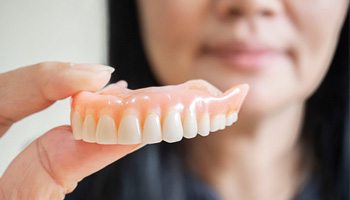
Once you finish having a snack or eating a meal, you should remove your dentures and give them a thorough rinse. This helps to prevent the buildup of food debris and plaque. Make sure the water you are using isn’t too hot, as high temperatures can warp the denture material, causing it to no longer fit as it should.
Clean Your Restoration
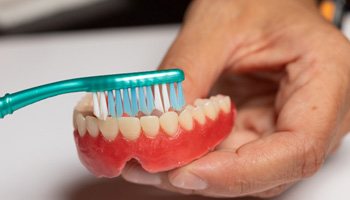
When it comes time to clean your dentures, remove them. Using a soft-bristled toothbrush and a small amount of unscented hand soap, mild dish soap, or denture cleanser, gently brush your dentures. Don’t use regular toothpaste, as dentures are not made to stand up to abrasive materials. If you aren’t going to be using your dentures again right away, put them in a container of water or denture-cleaning solution so they don’t dry out. Remember to always thoroughly rinse your dentures before putting them back into your mouth.
Keep Your Dentures Safe
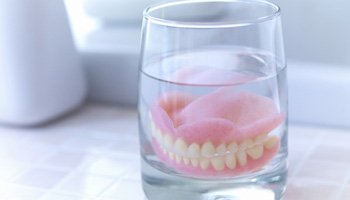
When you clean your dentures, place a towel beneath you just in case you accidentally drop them. This will reduce the probability of your dentures becoming damaged if they slip out of your hands. Remember to keep your restoration out of reach of small children and pets.
Remove Your Dentures When You Sleep

When it’s bedtime, take out your dentures. This is because wearing dentures restricts the circulation in your gums, leading to soft-tissue irritation. Sleeping with dentures has also been associated with higher levels of gum and tongue plaque. Overnight, keep your dentures in a denture-soaking solution. If you let them dry out, they might permanently lose their shape.
Notice Changes

You should always be on the lookout for changes in your mouth so you can address them during your routine checkups. This includes mouth sores, gum irritation, and signs of infection. If your dentures become damaged, you shouldn’t attempt to repair them on your own. Instead, give us a call so we can take a look.
All-on-4 Dental Implants
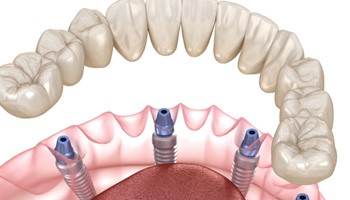
If you have all-on-4 dental implants, the aftercare process looks a little bit different. You should brush your dentures twice a day using a soft-bristled manual or electric toothbrush and non-abrasive toothpaste. You should also floss your replacement teeth twice daily. You can find floss threaders to help you clean beneath your denture. You may also want to consider investing in a water flosser. For additional freshness, rinse with an antibacterial mouthwash daily.
Denture FAQs
What is the Average Age for Dentures?
While tooth loss can affect anyone, it is an issue that is much more common among older patients. The American
Dental Association took a census that found that nearly 57% of people aged 65-74 wear some form of denture.
Approximately 33% of adults between the ages of 20-39 are missing at least one tooth while 66% of adults between
the ages of 40-64 are missing one or more teeth. The need for dentures generally increases as you age, but
people of all ages could potentially be candidates.
Will It Hurt to Get Dentures?
If you need to have teeth extracted before getting dentures, you are likely to experience some discomfort after
the oral surgery. Take your prescribed pain medication as directed. The discomfort should improve 3 to 5 days
after your procedure. When you first receive your new dentures, some minor irritation may occur while your mouth
adjusts to your new appliance. The amount of time that the discomfort lasts will vary from person to person. If
discomfort persists, give us a call so we can help.
Is It Hard to Talk with Dentures?
When you first get dentures, it will take time to get used to speaking with them because you are so used to
speaking with your natural teeth. The exact amount of time this takes will vary from person to person, but the
more you practice, the quicker you will adjust. Try reading out loud to yourself and repeating
difficult-to-pronounce words. Speak slowly at first to prevent your words from becoming muffled. You will be
talking just like you used to in no time!
Will Dentures Change the Shape of My Face?
When you lose your teeth, your facial muscles will begin to sag which can give your face a sunken appearance.
Getting dentures will mean providing support to the facial muscles that have collapsed, therefore improving your
appearance. Ill-fitting dentures may not give your facial muscles the proper support, so if you think that your
dentures aren’t fitting how they should, give us a call!
How Long Will You Have to Wait to Get Dentures After Your Teeth Are Pulled?
This depends on the type of denture that you are getting. The average wait time for traditional dentures is
between six to eight weeks. This period gives the gums a chance to heal as well as additional time to ensure
that your new denture fits properly. If you are getting implant dentures, you will need to wait between four to
six months for the implants to heal before you get your dentures. During your consultation with us, we can give
you a more specific estimate so you know what to expect.
Do Dentures Break Easily?
Dentures are very durable, but they aren’t indestructible and they don’t last forever. Typically,
they last between five and seven years before needing to be replaced. That being said, accidents can happen. The
most common reason for dentures breaking is accidentally dropping them. If your dentures are damaged, give us a
call so we can help. You shouldn’t attempt to fix them on your own.
Are Denture Adhesives Safe?
Denture adhesives are safe to use on a limited basis or prescribed by your oral health professional. Just be
careful of adhesives that contain zinc. Overusing these adhesives can cause you to ingest too much zinc, leading
to health complications. You should also ensure that you completely remove adhesive material at the end of each
day so the dentures can be thoroughly cleaned. Here are the recommendations that the FDA has for zinc:
- Follow instructions provided with denture adhesive
- Don’t use more product than recommended
- Know that products may not list ingredients
- Stop using adhesive if you experience numbness or tingling
- Track the amount of adhesive you use
Can I Use Regular Toothpaste to Clean My Dentures?
Your dentures should be brushed and rinsed daily, but toothpaste isn’t the right product to use. Toothpaste
is abrasive, so it can leave microscopic scratches on the surface of the dentures, resulting in damage over
time. Always use a soft-bristled toothbrush and hand soap or mild dish soap. You should clean your dentures
after every meal.



























